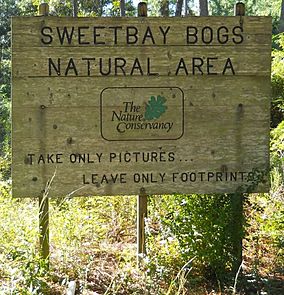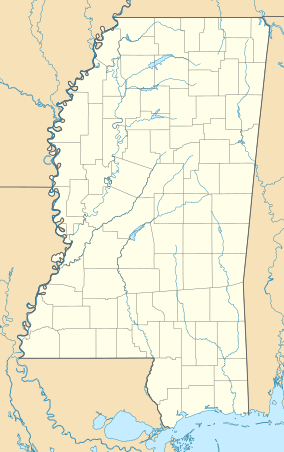Sweetbay Bogs Preserve facts for kids
Quick facts for kids Sweetbay Bogs Preserve |
|
|---|---|

Entrance at Sweetbay Bogs Preserve
|
|
| Location | Stone County, Mississippi, Mississippi, United States |
| Area | 194 acres (79 ha) |
| Established | 1989 |
The Sweetbay Bogs Preserve is a special natural area in Stone County, Mississippi. It was created in 1989 by the Mississippi Chapter of the Nature Conservancy. This preserve is home to a unique type of wetland called a bog. It's named after the many sweetbay trees that grow there. The preserve covers about 194 acres (78 hectares). It is located near Red Creek, which is part of the larger Pascagoula River area.
Amazing Plants and Animals of the Bog
Bogs are very important natural places. They provide a home for many rare plant species. These bogs are a key part of the longleaf pine forest ecosystem. This type of forest once covered much of the Gulf Coastal Plain in the southeastern United States.
Bogs that are found with longleaf pine forests are also called Pocosins. Many special plants live in the Sweetbay Bogs Preserve. Some of these rare plants include:
- Bog spicebush (Lindera subcoriacea)
- Coast sedge (Carex exilis)
- Flame flower (Macranthera flammea)
- Grass of Parnassus (Parnassia)
- Harper's yellow-eyed grass (Xyris scabrifolia)
- Large beakrush (Rhynchospora macra)
- Pineland bog button (Lachnocaulon digynum)
- Southern butterwort (Pinguicula primuliflora)
You can also find typical bog plants here. These include sundews (Drosera), butterworts (Pinguicula), and bladderworts (Utricularia). Pitcher plants (Sarracenia) are also common. These plants often have special ways to get nutrients, like trapping insects.
The preserve is also home to rare animals. One important animal found here is the gopher tortoise (Gopherus polyphemus). These tortoises dig long tunnels where they live.
Keeping the Bogs Healthy
The Nature Conservancy helps manage the Sweetbay Bogs Preserve. They use a method called prescribed burning. This means they carefully set small fires on purpose. These fires help stop other plants from growing too much. This allows the native bog plants to flower and produce seeds.
It's also important to protect the land around the preserve. Limiting activities nearby helps keep the water flowing naturally. It also makes sure there is enough water stored in the ground. This is very important for the bog habitat to survive and stay healthy.


